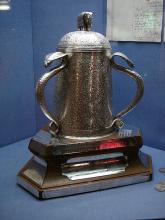The Calcutta Cup is a rugby union trophy awarded to the winner of an annual match between England and Scotland during the Six Nations Championship. The first match was played on Christmas Day, 1872 in Calcutta and its popularity paved the way for the formation of the Calcutta Football Club. However, largely due to the climate not being conducive to the sport, the club disbanded in 1878. Just before doing so, the members, in an attempt to preserve the history of the contest, decided to use the club's remaining funds in the bank to create a trophy - The Calcutta Cup - which was presented to the Rugby Football Union in England with the recommendation that it be used as an annual challenge cup.
The funds in question were withdrawn as Silver Rupees - the currency of the time - and literally melted down to create the cup. The cup which is 45 cm tall, was created by Indian artisans and features three handles fashioned as cobras and a lid surmounted by an elephant. The original cup is currently in a fragile state and is on display at the World Rugby Museum in Twickenham stadium in Middlesex, England.

